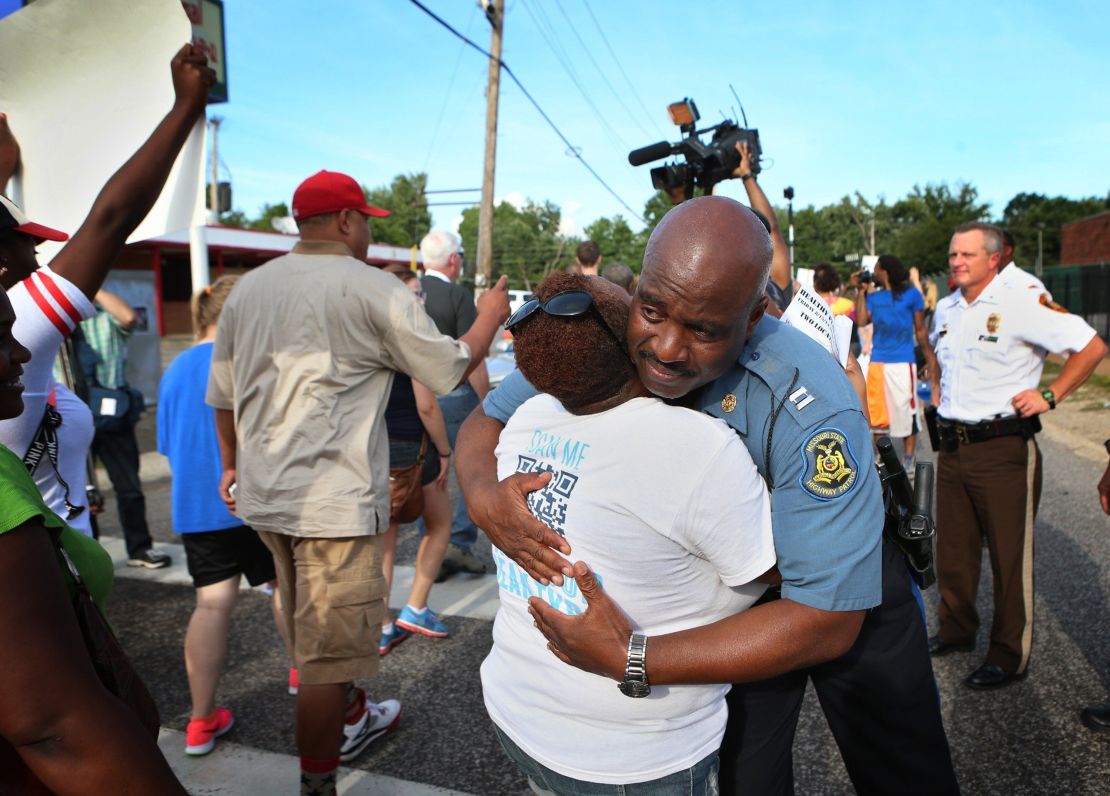Story highlights
The man in charge of security in Ferguson walks with protesters
Missouri Highway Patrol Capt. Ron Johnson was tapped for the job Thursday
"I'm here to make sure they hear what I'm talking about," Johnson says Friday
State troopers took over security in Ferguson after days of clashes
One day after leading a peaceful procession of demonstrators along the streets of his native Ferguson, Missouri, State Highway Patrol Capt. Ron Johnson turned an outdoor news conference into an impromptu community forum.
“I’m here to make sure they hear what I’m talking about,” Johnson, standing with Gov. Jay Nixon and others, told reporters Friday.
He stepped away from the microphone and moved closer to members of a community still seething after Saturday’s racially-charged police shooting of an unarmed black teenager.
“Move in a little closer,” he implored residents who had gathered behind reporters. “Come in closer.”

For the man tapped Thursday to restore order in the restive St. Louis suburb where sometimes violent protests were met with a heavy-handed police response, the mission is personal. Demonstrations and confrontations with local police marked the night hours earlier this week, in the wake of a weekend police shooting by a white officer that left an 18-year-old African-American man dead.
Michael Brown, who was unarmed, died in the Saturday shooting. Police say he was trying to grab the officer’s gun. Witnesses say Brown was holding his hands in the air when he was fatally shot.
State troopers took over security after days of clashes between protesters and local police, who have been accused of using excessive force – including rubber bullets and tear gas – in response to the demonstrations.
“The people of our community need to hear what I’m saying,” Johnson told the crowd. “They have questions. This isn’t about Ron Johnson … It is about the people that live in our community.”
On Thursday night, Johnson and other officials marched with the protesters and, in his words, they “walked and shook hands and talked to people and listened and promised that we’re going to communicate better.”
“Last night was a great night,” he recalled on Friday. “There were no calls for service. We did not deploy tear gas. We did not have road blocks. We did not make any arrests. It was a good night. People were talking.”
At Friday’s news conference, residents expressed skepticism on details released earlier by Ferguson’s police chief implicating Brown as the “primary suspect” in a convenience store robbery moments before he was killed. Johnson said he would brief residents about the claims after meeting with Police Chief Thomas Jackson.
But he urged residents “to make sure that we don’t burn down our own house, that we don’t go down there and vandalize our own buildings…That doesn’t prove a point. That does not solve the issue. That hurts this community, and that’s what I don’t want.”
At one point in the news conference, a man who said he was the father of seven children talked about his kids being “scared to death” of the police.
Johnson responded more like a pastor than a law enforcement officer: “When I got home, my daughter said, ‘Daddy, were you scared?’ I said, ‘Just a little.’ She said, ‘Daddy, I want you to remember when Jesus asked Peter to walk with him in the water. When Peter got scared Jesus picked him up and said have faith.’ Today, we need to be just like Peter.”
On social media, people praised Johnson’s handling of the situation.
“Capt. Johnson. Inspiring. What an incredible night this is in #Ferguson,” one person tweeted.
Music impresario Russell Simmons tweeted: “When police know the community and come from community, the relationship can be transformed overnight. Well done Capt. Johnson. #Ferguson”
When Johnson took over security in Ferguson Thursday, the suburb had become a flashpoint.
“A young man lost his life and so I grieve for that family because I have a son,” he told CNN’s Jake Tapper. “We’re going to look at this from a personal standpoint and if that was my son – or that was my friend – how would I feel?”
Johnson grew up in the area and considers it both his community and his home.
5 things to know about Michael Brown’s shooting
Although locals say race relations have long been troubled between the city’s mostly African-American population and the mostly white police force, anger spilled out after Brown’s death.
“It means a lot to me, personally, that we break the cycle of violence, diffuse the tension and build trust – showing the utmost respect for every interaction with every citizen,” Johnson, who is African-American, told reporters.
“Moving forward, I’m confident that the patrol and police resources present here in Ferguson will do just that.”
Johnson said he is committed to the new approach.
He stressed the importance of not focusing on the past.
“We’re going to start from today. We’re not going to look back in the past,” Johnson said. “We are going to have a different approach and have the approach that we’re in this together.”
Complete coverage of Ferguson shooting and protests
A white man’s response to Ferguson
CNN’s Catherine E. Shoichet contributed to this report.










